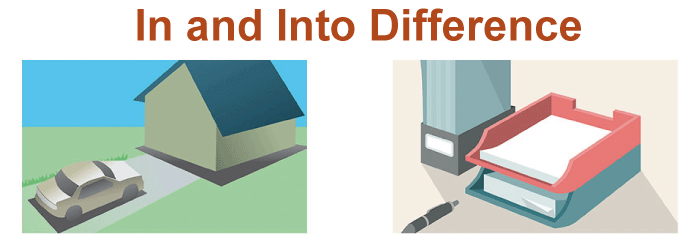Difference between In and Into
In:

Essentially, "expressing the situation of something that is or appears to be enclosed or surrounded by something else" is what "in" signifies.
In is generally a preposition, but depending on the context, it can also function as an adverb, adjective, or noun.
Into:

When either the word "in" or the word "to" is a component of a verbal sentence, English grammar requires that you use "in to."
When "in" is a component of a verb phrase: Because the word "in" is a part of the verb phrase "call in," writing "I will call into the radio show" is acceptable.
It is acceptable to write "walked in to eat dinner" when the word "to" is a verb component in the infinitive form.
The following points highlight the distinctions between into and in:

- When one object appears to be covered or encompassed by another, the word "in" is used to represent the situation of the object. On the other hand, the word "into" is used to describe a movement of an item that completely covers it in a certain area.
- When addressing an object's destination, the word "into" is used instead of "in," which explains an object's position.
- When something is at "rest" or not "in movement," the word "in" is commonly used. In contrast, the word "into" is used when something moves or shifts.
In and Into Difference
Important distinctions between in and into

| In |
Into |
| It can be used as a noun, adjectival adjective, preposition, or adverb. |
Only be used as a preposition |
| Used to describe a situation, a period, a separation from something, a person's mental or physical state, etc. |
Used to describe an event, movement, or the change |
Some examples of In

Prepositional phrase: in
- Finally, the animal is in its cage. (indicating the inside or interior of something)
- The woman said her kid was in the hospital's emergency ward.
- In the late 1988s, my parents first became together. (indicating a time period)
- My brother promised to call me again in 10 minutes. (indicating an amount of time)
- Watercolor is my sister's favorite choice for drawing. (indicating a means or manner of something)
- According to the research, an infectious disease is detected in the area in one out of every three persons. ( Indicating a ratio)
As an Adverb, in
- The citizens affirmed that they had never heard the thief enter. (Indicating movement)
- Police punished Raj by locking him in a completely dark room. (Indicating the situation of being enclosed)
- Despite the delay, the bus arrived at the scheduled time. (Indicating arrival)
Adjective use of in
- On Sunday, I won't be here. (Suggesting that one is present at their house or place of business)
- It's fashionable right now, according to shopkeepers, to wear a cardigan. (Informal manner to indicate something fashionable and trending)
the noun "in."
- When used as a noun, it suggests a position of influence with a powerful or well-known someone. For example,
- Individuals knew that he had an in with the new singer.
- As a result, depending on its grammatical categories, In has a wide range of uses.
Some examples of Into:

- Refer to the examples provided.
- Ram got into the car just now.
- Peel the Mango and throw the peels into the dustbin.
- Ram the laptop language changed into Canadian
- The first twisting road you come to is the one that will take you into the city.
Conclusion
Without understanding the variations between the phrases In and Into's grammatical use, people frequently misuse them.
The distinction between in and into is that the former suggests a state or location, while the latter indicates a movement or activity. Additionally, unlike into, which may only be a preposition, in can occasionally be a preposition, adverb, adjective, and noun.
|






 For Videos Join Our Youtube Channel: Join Now
For Videos Join Our Youtube Channel: Join Now










